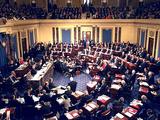The Republicans ‘Stand Ready’ for the Payroll Tax Talks
Post Views 0Fresh off of the deficit-cutting supercommittee’s impasses, leaders in both of the chambers of Congress said that they are prepared to consider extending the payroll tax cut that is set to expire on Dec. 31.
Adam Jentleson, who is a spokesman for Majority Leader Harry Reid, a Nevada Democrat, said yesterday that the U.S. Senate may vote on an extension as soon as next week. The House Speaker, John Boehner said that he is open to discussing the expiring payroll cut with the Obama administration.
”We told the president in September that we stand ready to have an honest and fruitful discussion with him regarding the payroll tax extension, and that invitation stands,” Boehner, who is an Ohio Republican, said in a statement yesterday.
Lawmakers returning to Washington next week after a Thanksgiving break will spend the rest of the year debating crucial tax issues that have divided the political parties in half. In addition to all of the payroll tax cuts, they must decide whether or not to extend the expanded unemployment benefits and a package of miscellaneous tax breaks that expire Dec. 31.
U.S. President, Barack Obama, spoke at a Manchester, New Hampshire, high school yesterday about the payroll tax cuts and said that there would be economic consequences if it isn’t extended.
”If Congress refuses to act, then middle-class families are going to get hit with a tax increase at the worst possible time,” he said. ”It would be bad for the economy. It would be bad for employment.”
Democratic leaders in the House, also including Nancy Pelosi of California, Steny Hoyer of Maryland and James Clyburn of South Carolina, sent a letter to Boehner yesterday asking him to allow a vote on a payroll tax cut extension.
Tom Porcelli, who is the chief U.S. market economist at RBC Capital Markets, told the Bloomberg Television yesterday that if the break isn’t extended into 2012, ”you are literally removing 1.2 percentage points” from U.S. gross domestic product.
The Social Security portion of payroll taxes, which will actually be levied on the first $110,100 of income in 2012, is split between employees and employers. Each of the sides pay 6.2 percent of wages.
For 2011, the Social Security payroll tax for the employees was lowered to 4.2 percent. A worker that is earning $50,000 a year and who is paid biweekly has been saving $38.46 in each paycheck.
According to the congressional Joint Committee on Taxation, this year’s tax break cost the government $111.7 billion in foregone revenue. The U.S. transferred some money from the general fund to cover the reduced funding for Social Security.
At the very minimum, Obama wants to see the current tax cut for employees extended for 2012. He also has called on Congress to reduce the payroll levy to 3.1 percent for all employees and employers. That proposal has languished in the Congress.
The Republicans 'Stand Ready' for the Payroll Tax Talks by Harrison Barnes



 2006-2015 Median Weekly Earnings of Full-Time Workers in the United States
2006-2015 Median Weekly Earnings of Full-Time Workers in the United States  November Posts Another Strong Job Report
November Posts Another Strong Job Report  US Dollar Gaining Momentum
US Dollar Gaining Momentum  Atlanta’s Top Telecom, Cell Phone, and Electronics Manufacturers
Atlanta’s Top Telecom, Cell Phone, and Electronics Manufacturers  Amazon May Have a Better Grasp on Workplace Culture
Amazon May Have a Better Grasp on Workplace Culture  Expected Changes in 2016 to the Workplace
Expected Changes in 2016 to the Workplace